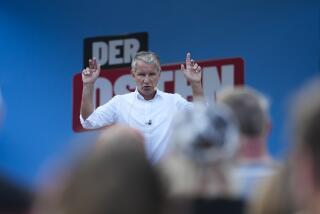Voters in German State Rebuff Nationalist
DUESSELDORF, Germany — To a conservative gubernatorial challenger’s anti-immigrant campaign demand for aid to “our children instead of Indians,” voters in Germany’s most populous state gave a decisive reply Sunday: The incumbent instead of you.
North Rhine-Westphalia Gov. Wolfgang Clement and fellow Social Democrats easily sailed past Christian Democratic challenger Juergen Ruettgers and his colleagues in a clear show of voter revulsion at Ruettgers’ attempts to stir up fears that foreigners pose a threat to German jobs.
Only a few months ago, Ruettgers and the Christian Democratic Union had been forecast to sweep into power in this state, which is home to 20% of Germany’s 82 million people, tipping the national political balance against Social Democratic Chancellor Gerhard Schroeder and perhaps even forcing early national elections.
But a recent economic upswing credited to Schroeder, a slush-fund scandal impugning former chancellor and ex-CDU boss Helmut Kohl and Ruettgers’ crude efforts to stir xenophobia among jobless Germans combined to turn popular support back toward the Social Democrats.
Despite the moral victory and success in what was viewed as a midterm referendum on Schroeder’s leadership, the Social Democrats posted a poorer showing than during the last state vote, in 1995, and will need the backing of a minor party to form a majority coalition.
Social Democrats have ruled this state encompassing the economically volatile Rhine and Ruhr river valleys for 34 years--usually in partnership with the environmentalist Greens, in a regional version of the leftist coalition that has been in power at the federal level since October 1998.
But the impressive showing by another small party, the business-friendly liberal Free Democrats, who captured nearly 10% of the state vote, raised the specter of political horse-trading in the wake of this last contest among Germany’s 16 states until 2002.
The Free Democrats had been out of the North Rhine-Westphalia state legislature since failing in the last election to surpass a 5% threshold for winning seats, and they waged a determined campaign this time not only to reenter the state parliament but to supplant the Greens in the coalition.
Former Foreign Minister Hans-Dietrich Genscher, the gray eminence of the Free Democrats, was on hand for jubilant celebrations of the party’s best showing in the state in 46 years, and he pushed to join a coalition. The Social Democrats “must decide whether they want to align with losers or with those who stand for progress,” he said.
Unofficial returns gave the Social Democrats 43%, the Christian Democrats 37%, the Free Democrats nearly 10% and the Greens just more than 7%. Voter turnout was only 56%--poor by European standards--and election analysts blamed the weekend’s glorious weather and a huge beer festival here for distracting voters.
Jobs are the gut issue in North Rhine-Westphalia, where unemployment is as high as 17% in some cities as the state shifts ambitiously from dependence on smokestack industries to sleek high-tech.
Unemployment nationwide has dropped slightly from a 12% high two years ago to a shade under 10%, but many voters still fear that any easing of immigration rules will result in more job losses.
Like other leading industrial states, Germany suffers a severe shortage of high-technology experts. Recent surveys estimate the deficit at more than 75,000 specialists, which prompted Schroeder to propose two months ago that Germany issue special visas for 20,000 foreign computer experts a year.
Recent outbursts of racial intolerance and neo-Nazi violence in Germany’s troubled eastern states have jolted moderates throughout the country into reflection on their image as a country that has yet to fully overcome its World War II legacy. That heightened consciousness caused the anti-immigrant strategy of Ruettgers to backfire even among his conservative colleagues. The Christian Democrats’ respected new leader, Angela Merkel, appeared with Ruettgers only twice during the campaign, apparently at odds with the candidate’s provocative platform.
Many voters were likewise turned off.
“Ruettgers should be ashamed of himself,” said Michael Froempken, a 41-year-old banker, as he cast his ballot in the Rhine riverfront village of Niederberg. “I think he did a lot of damage to his party with this anti-foreigner position.”
Ruettgers’ campaign theme, which borrowed heavily from Hesse Gov. Roland Koch’s successful petition drive against relaxed citizenship laws a year ago, nevertheless plucked heart chords among the tradition-bound blue-collar ranks along the Rhine.
“We don’t need Indians or any other foreigners. I stand fully behind Juergen Ruettgers, who only said what a lot of people were thinking,” said Angelika Meister, a 49-year-old homemaker.
More to Read
Sign up for Essential California
The most important California stories and recommendations in your inbox every morning.
You may occasionally receive promotional content from the Los Angeles Times.











